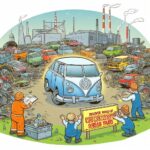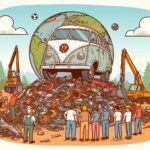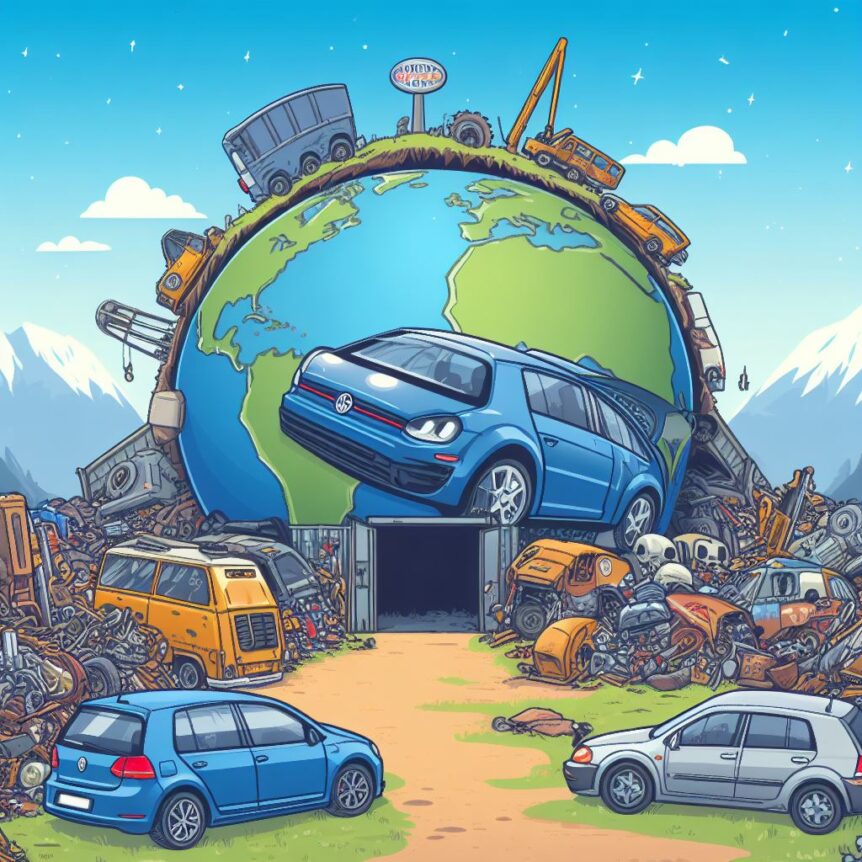Volkswagen, a globally recognized German automobile manufacturer, has been synonymous with quality and reliability for decades. However, what happens to these vehicles as they near the end of their lifespan? The answer lies in the world of Volkswagen scrap yards, a seldom-explored but highly valuable sector of the automotive industry. These yards not only cater to car enthusiasts but also play a crucial role in environmental conservation and economic efficiency.
When a Volkswagen reaches the end of its service life, it doesn’t just end up as scrap. Instead, it finds a new lease on life in a Volkswagen scrap yard. These yards are responsible for processing the vehicles, extracting usable parts, and recycling the rest. The parts are then sold to mechanics, enthusiasts, and even other manufacturers, ensuring the parts have a second life.
The operation of a scrap yard is a meticulous process. The vehicles are first cleaned of fluids, which are then sold separately. Specific parts like the motor or the battery are also removed and sold. If the motor is in good condition, it is often sent to a third-party vendor for restoration, where it is rebuilt and resold with a warranty. The batteries, if still usable, are also sold at a discount.
The Volkswagen scrap yards ensure that the vehicles are well-organized, often grouping them by model and year. This organization makes it easier for customers to find the used parts they need. Some yards even maintain an electronic inventory list of all the Volkswagen models in their lot, making it easier for customers to find specific models or parts.
After the vehicles have been stripped down to their frames, they are crushed and sold for scrap metal. This not only clears space for new inventory but also provides a financial incentive for salvage yards to recycle as much as possible from each vehicle.
The Volkswagen scrap yards are more than just a source of parts. They are an integral part of the community, keeping unwanted cars off the streets and contributing to the recycling of materials. They serve as an automotive recycling center, ensuring that valuable resources are not wasted but are instead recycled and reused.
Volkswagen scrap yards are more than just a source of parts. They play a crucial role in environmental conservation, economic efficiency, and even the automotive community. By recycling vehicles and their parts, they ensure that valuable resources are not wasted but are instead reused and recycled. Whether you’re a car enthusiast, a mechanic, or an environmentalist, there’s something valuable to be found in a Volkswagen scrap yard.

The Importance of Volkswagen Scrap Yards
Volkswagen scrap yards play a crucial role in the automotive industry by serving as repositories for dismantled Volkswagen vehicles that are no longer usable. These yards, also known as salvage yards, are essentially treasure troves of valuable parts and materials that can be recycled and repurposed.
The process of dismantling these vehicles contributes to the recycling efforts and promotes sustainable development. This practice aligns with the 3 R’s of recycling: reducing waste, reusing materials, and recycling waste into new products.
In these yards, components such as engines, transmissions, body panels, and interiors are meticulously dismantled and sorted. These parts can then be used to repair or restore other Volkswagen vehicles, providing a cost-effective solution for vehicle maintenance and preservation.
Moreover, the recycling process at these yards not only helps in reducing the environmental impact but also contributes to the reduction of carbon and greenhouse gas emissions. By reusing and recycling parts, we can decrease the need for new production, thereby lowering the demand for raw materials and energy.
Volkswagen scrap yards are not just facilities for dismantling old vehicles, but they are also significant contributors to the recycling efforts and sustainable development. They provide a valuable resource for parts and materials that can be reused or recycled, thereby promoting a greener and more sustainable automotive industry.

The Environmental Impact
Volkswagen’s scrap yards represent a significant environmental benefit beyond their economic value. As vehicles reach the end of their lifecycle, many of their components can be repurposed or recycled, significantly reducing the demand for new raw materials. This not only conserves natural resources but also minimizes the environmental impact associated with the production of new parts. Volkswagen has been recognizing this potential for sustainability and has integrated recyclability considerations into the design and development of its vehicles.
Volkswagen’s environmental strategy is comprehensive and multifaceted. The company has set guidelines for environmental decision-making and has established an environmental policy that outlines parameters for the conduct and working methods of management and staff in five areas: management behavior, compliance, environmental protection, collaboration with stakeholders, and continuous improvement.
The company’s environmental mission statement, go to zero, aims to reduce environmental impact throughout the entire life cycle of its products. This includes everything from raw material extraction to end-of-life disposal. Volkswagen is committed to complying with environmental regulations, standards, and voluntary commitments.
Volkswagen’s environmental strategy also includes efforts to conserve resources. The company aims to reduce the volumes of primary raw materials needed by using recycled material and renewable raw materials. They also aim to maximize their energy and resource efficiency and establish loops for materials and water. Together with their business partners, they aim to reduce the amount of natural resources utilized throughout their supply chain.
Volkswagen’s scrap yards and their overall environmental strategy represent a significant step towards a more sustainable future. By repurposing and recycling vehicle components, they are reducing the demand for new raw materials, conserving natural resources, and minimizing the environmental impact associated with the production of new parts. This is just one aspect of Volkswagen’s comprehensive and multifaceted environmental strategy, which also includes efforts to conserve resources, maximize efficiency, and establish loops for materials and water.

The Process of Recycling at a Volkswagen Scrap Yard
Volkswagen scrap yards implement a rigorous process to achieve maximum utilization of parts and materials from vehicles. The process begins with a thorough inspection of the vehicle, during which parts that can be salvaged for resale are identified. These parts are meticulously removed, cleaned, and catalogued for potential resale.
The fluids within the vehicle, such as oil, coolant, and brake fluid, are then carefully drained and properly disposed of to prevent environmental pollution. This meticulous handling of potentially harmful substances demonstrates Volkswagen’s commitment to environmental stewardship.
The remaining shell of the vehicle is then crushed, a process that ensures every usable part is extracted from the vehicle. The crushed metal is then sent for recycling, further contributing to the reduction of waste and the preservation of resources.
This process not only ensures that every possible element of the vehicle is repurposed, but also prevents the vehicle from ending up in a landfill, thereby reducing the environmental impact. By following this process, Volkswagen scrap yards play a critical role in promoting sustainability and responsible waste management.
Moreover, the recycling of these parts not only extends the life of the parts themselves but also supports the economy by creating jobs in the recycling industry. It also helps to reduce manufacturing and transportation emissions, further contributing to a more sustainable future.
In conclusion, the recycling process at Volkswagen scrap yards is a testament to the company’s commitment to environmental stewardship and responsible waste management. It is a model of sustainability that can be emulated by other industries as well.

The Role of Volkswagen Scrap Yards in the Automotive Ecosystem
Volkswagen scrap yards serve as a pivotal part of the automotive ecosystem, offering an economical source of spare parts for both individual vehicle owners and commercial repair shops. This not only aids in reducing the overall cost of vehicle maintenance and repairs but also plays a crucial role in the restoration of vintage vehicles, providing access to rare and discontinued parts. Additionally, the recycling of old vehicles contributes to the circular economy, fostering sustainability, and mitigating environmental impacts.
The Volkswagen scrap yards are a critical part of the automotive ecosystem, providing a cost-effective source of parts for both individual vehicle owners and commercial repair shops. This service can significantly lower the costs associated with vehicle maintenance and repairs. For those who have a passion for restoration, these yards can be a veritable treasure trove of rare and vintage parts that are no longer in production. Furthermore, the recycling of old vehicles through these yards contributes to the circular economy, thereby promoting sustainability and helping to reduce the environmental impact.

Conclusion: The Hidden Value of Volkswagen Scrap Yards
In conclusion, Volkswagen scrap yards represent an important facet of the automotive industry that often goes unnoticed. They offer a practical solution to the problem of vehicle disposal, while simultaneously providing a valuable resource for parts and materials. Whether you’re a car enthusiast looking for that elusive part, a repair shop seeking cost-effective solutions, or an environmental advocate championing recycling, the world of Volkswagen scrap yards has something to offer. So next time you see an old Volkswagen, remember – it’s not the end of its journey, but rather the beginning of a new life in the form of recycled parts and materials.




